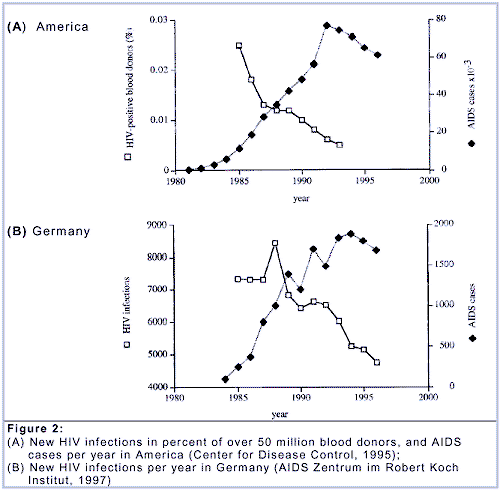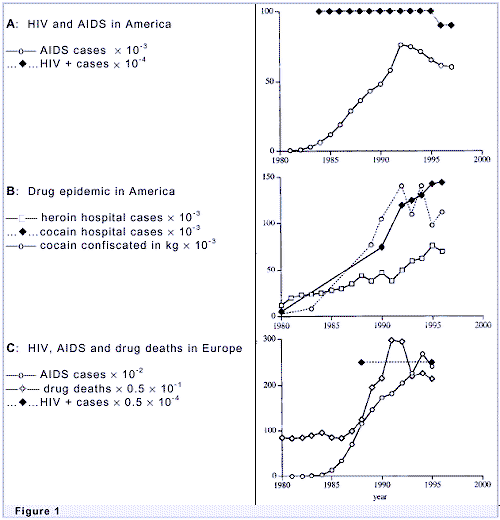Skip to comments.
The World’s Most Reviled Genius (buck politically correct "science", have your career ruined)
Newsweek ^
| October 9, 2009
| Jeneen Interlandi
Posted on 10/09/2009 1:36:22 PM PDT by GodGunsGuts
Can the scientist who denied the cause of AIDS be trusted to cure cancer?
--snip--
...In the past three decades, Duesberg has been described as a genius, a martyr, and a genocidal lunatic—often by the same person, usually amid the fierce debates and international headlines that come with major scientific breakthroughs. In 1971, at the age of 33, he became the first scientist to identify a cancer-causing gene—a biological holy grail that secured his place among an elite group of the country's top researchers. Tenure at Berkeley and a coveted spot in the National Academy of Sciences followed. So did rumors of a Nobel and millions in grant money from the National Cancer Institute.
Then in 1988, Duesberg broke ranks with his colleagues and postulated that the newly discovered human immuno-deficiency virus (HIV) was not the cause of AIDS. Rather, he declared, it was a harmless passenger virus, found by coincidence in patients whose illnesses stemmed from a constellation of other factors including malnutrition and substance abuse. For this, he was summarily cast out of Eden: Grant money evaporated. Graduate students disappeared. Nobel laureates stopped inviting him to dinner. Of course, he might have been forgiven—or at least forgotten—were it not for...
(Excerpt) Read more at newsweek.com ...
TOPICS: Crime/Corruption; Culture/Society; Government; News/Current Events
KEYWORDS: agenda; aids; belongsinreligion; cancer; cdc; corruption; creation; democrats; duesberg; globalwarming; healthcare; homosexualagenda; medicine; moralabsolutes; nih; nobel; nobelpeaceprize; nobelprize; notasciencetopic; politicalcorrectness; politicallycorrect; prolife; propellerbeanie; publichealth; rethinkingaids; science
Navigation: use the links below to view more comments.
first previous 1-20, 21-28 last
To: GodGunsGuts
I would like to revise and extend my remarks.
The motto in academia used to be Publish or Perish. Since the advent of government funding of research, this has become Get Funded or Get Out.
Research universities tell newly-hired assistant professors in the sciences and engineering that they must bring in a certain level of federal funding (say, $500,000 per year) or they can expect to be looking for work elsewhere. (Heaven help you if you prefer to teach rather than do research—they can hire part-timers to teach.)
Note that I wrote federal funding. For some reason, a dollar from the National Institutes for Health (NIH) or the National Science Foundation (NSF) counts more than a dollar from a private source.
All of this gives the federal funding agencies tremendous power to set the agenda for for research and development in the universities. Researchers know that they have a better chance of getting funded if they tailor their research to the interests of the federal government.
I have been told by project directors at NSF that they do not want to fund "risky" or even "novel" research. They prefer to give money to researchers who have a "proven track record." That means researchers who have a publication record in an approved field. It helps to be associated with an established research institution. It also helps to have contacts at the funding agencies, preferably former students and colleagues who will look favorably upon one's grant applications.
Unfortunately for Duesberg, he has run afoul of the scientists who control the review process at the funding agencies. I doubt he has many friends or former students at those agencies who can steer funding his way. He has tenure, so U. C. Berkeley cannot fire him merely for not bringing in money; but the administrators there can find ways to make his life miserable.
I think a strong case can be made for getting the federal government out of the business of funding research—after we get them out of the business of funding health care.
To: <1/1,000,000th%
==The problems with Duesberg and his methods were well documented.
If it's so well documented, then why does Duesberg tear his "scientific" opposition to shreds in debate (to include printed debates in scientific journals)?
==If Duesberg’s claims were true, HIV screening of the blood supply wouldn’t have reduced the rate that recipients of blood, and blood products, get AIDS.
Did you take a look at the graph I sent you? HIV screening of the blood supply did nothing to reduce the number of AIDS cases. Indeed, the number of AIDS cases continued their steep rise for almost a decade, even as the number of HIV-positive blood donors steeply declined during that same period.

==You are incorrect. It's well known that AIDS takes years to develop from HIV infection.
You mean the infamous latency period that they kept have to revise for less than a year, to a year, to three years, to five years, to ten years, to twelve years, etc, etc?
Tell me 1/1%, how do you explain the total number of HIV infections remaining constant as the number of AIDS cases increased, and then decreased. Do you suppose it is possible that it has something to do with the graphs below?

To: Logophile
==I think a strong case can be made for getting the federal government out of the business of funding research
Hear, hear! The feds are ruining science. With the exceptions of national defense and intelligence, science should be returned to the private sector where it belongs!
To: GodGunsGuts
His problem was that he couldn’t show why keeping the AIDS virus out of the blood supply prevented any new AIDS clinical diagnoses. This is still true 20 years later. No virus, no disease. Research on AIDS has become sufficiently politicized that it is difficult to properly evaluate certain hypotheses. For example, if AIDS is defined as the occurrence of certain symptoms in a person who is HIV-positive, then by definition HIV will be a necessary causal factor for AIDS, but that won't imply that the HIV-AIDS link is meaningful (nor that it isn't).
The association between HIV and AIDS (the combination of symptoms associated with AIDS is much more common in people who are HIV-positive than in those who aren't) is sufficiently strong as to clearly merit study. Even if HIV is in fact harmless, its association with AIDS would, at minimum, suggest that tracking HIV may be useful as a proxy for tracking AIDS. That having been said, I would think it very important to be mindful of various ways that AIDS might be caused by a contagious agent other than HIV; if it is caused by some other agent, and an HIV-negative person infected with that agent infects other people, the HIV-antibody test might become ineffective at screening for AIDS.
24
posted on
10/09/2009 3:41:54 PM PDT
by
supercat
(Barry Soetoro == Bravo Sierra)
To: GodGunsGuts
Hear, hear! The feds are ruining science. With the exceptions of national defense and intelligence, science should be returned to the private sector where it belongs! Not to go off topic, but this sounds alot like profiling...
instead of following the actual evidence to the end of the trail, scientists are encouraged to only look into "approved" targets.
I thought our lovable government frowned on that tactic.
Also, haven't most of the really big leaps been made by the so-called renegades?
25
posted on
10/09/2009 4:14:11 PM PDT
by
Nitro
To: GodGunsGuts
Having read the study at medscape I came away with different understanding of what was saying in at least one important area: what constituted a “Grade 4” event.
Grade 4 events were anything not directly attributed to AIDS, for example, the various kinds of hepatitis (viral caused), and psychiatric problems. That would give a somewhat different picture of what the review showed.
26
posted on
10/09/2009 5:17:28 PM PDT
by
count-your-change
(You don't have be brilliant, not being stupid is enough.)
To: GodGunsGuts
Federal funding does vastly augment the research output of this country. It can be argued that the money is not being spent cost-effectively, but I have seen first-hand that it does produce real knowledge that otherwise would not exist.
Without federal support there would be far less research being done, especially in basic science where discoveries cannot be readily translated into profitable enterprises.
I believe that knowledge about the mechanisms of life is inherently valuable, even if it doesn’t shortly lead to tangible (i.e. lucrative) augmentations to our existence. Investments in basic science lead eventually to practical applications, but usually not on a timescale a private investor could afford to bank on.
That said, there is indisputably a “scientific establishment” which discriminates between scientists, most obviously based on reputation (i.e. track record), but also on whether or not they’re moving in the “consensus” direction. In many cases, these policies serve their purported purpose, which is to invest money where it is most likely to yield results. However, it can also lead to the perpetuation of groupthink and the entrenchment of “scientific mythologies,” which is obviously a bad thing. I don’t think abolishing federal funding is the answer though. There are far worse uses for our tax dollars.
To: ivyleaguebrat
I should have also noted that in an age where manufacturing has been almost completely outsourced, and the “service economy” is going the same way, scientific research is one of the few areas where the USA totally dominates. One of the few areas that draws the most talented people from all over the world. I don’t want to risk throwing that way, I believe it is an enormous asset.
Navigation: use the links below to view more comments.
first previous 1-20, 21-28 last
Disclaimer:
Opinions posted on Free Republic are those of the individual
posters and do not necessarily represent the opinion of Free Republic or its
management. All materials posted herein are protected by copyright law and the
exemption for fair use of copyrighted works.
FreeRepublic.com is powered by software copyright 2000-2008 John Robinson

